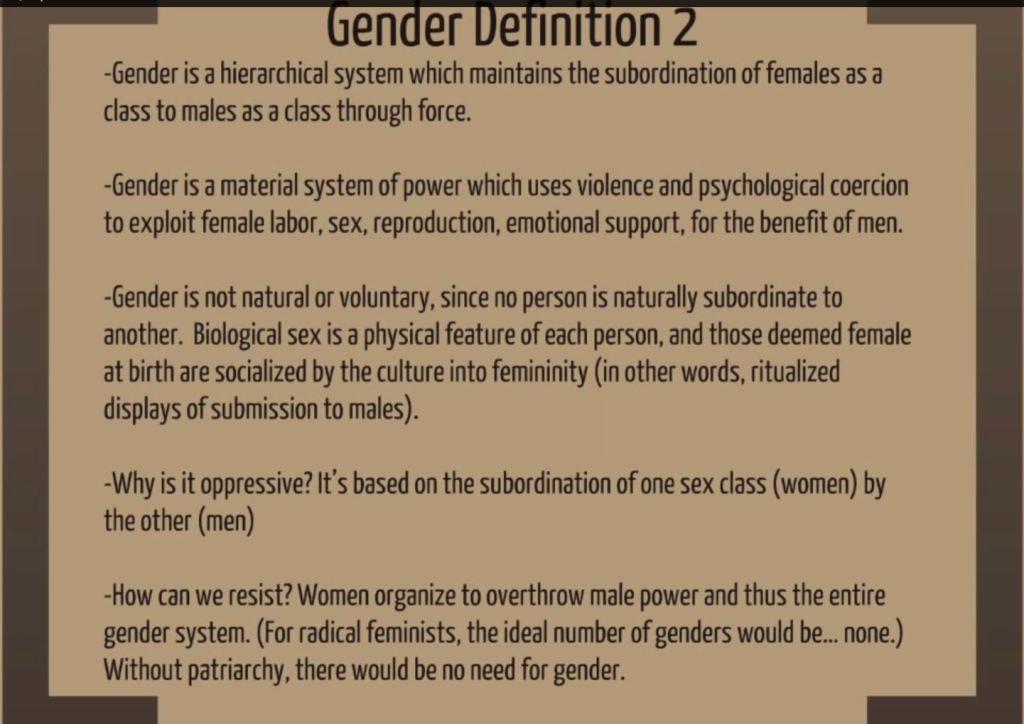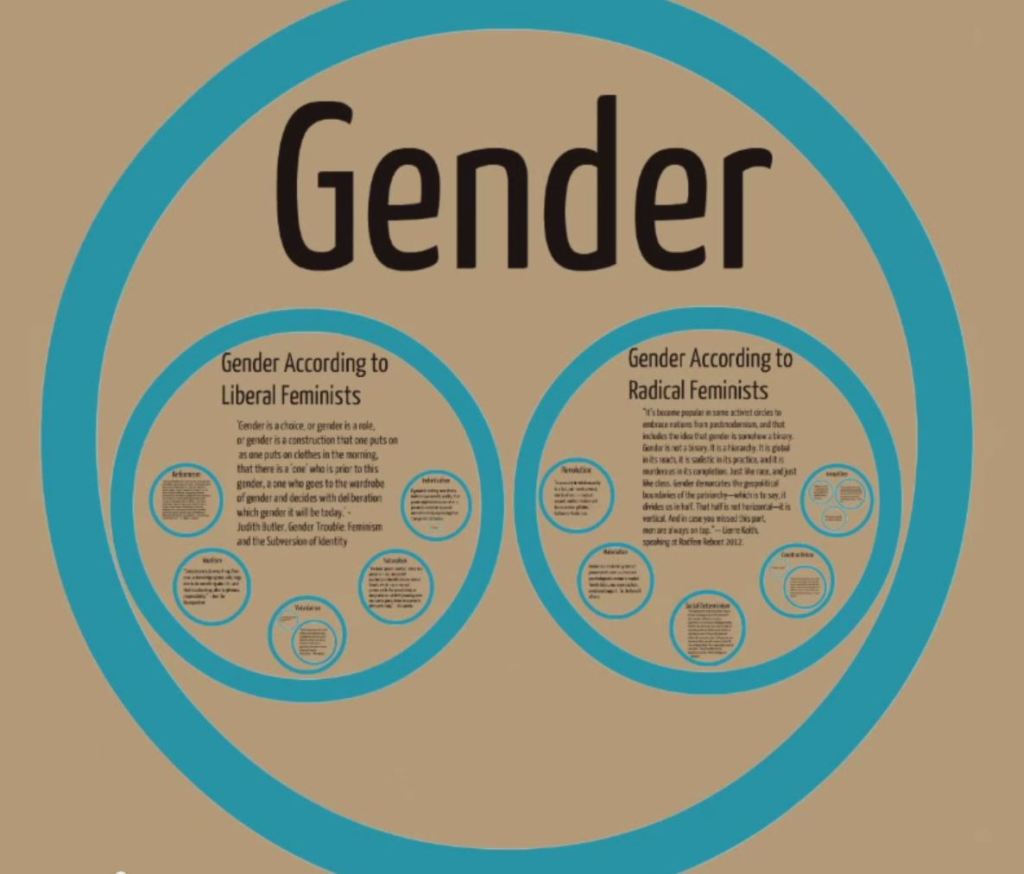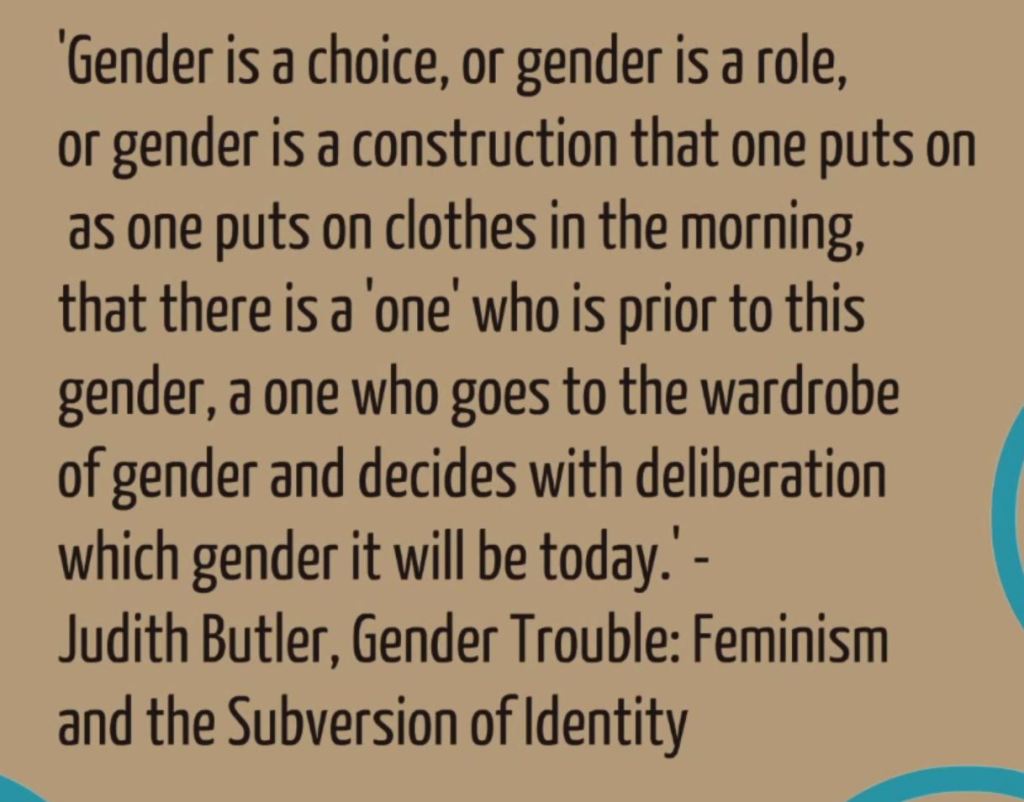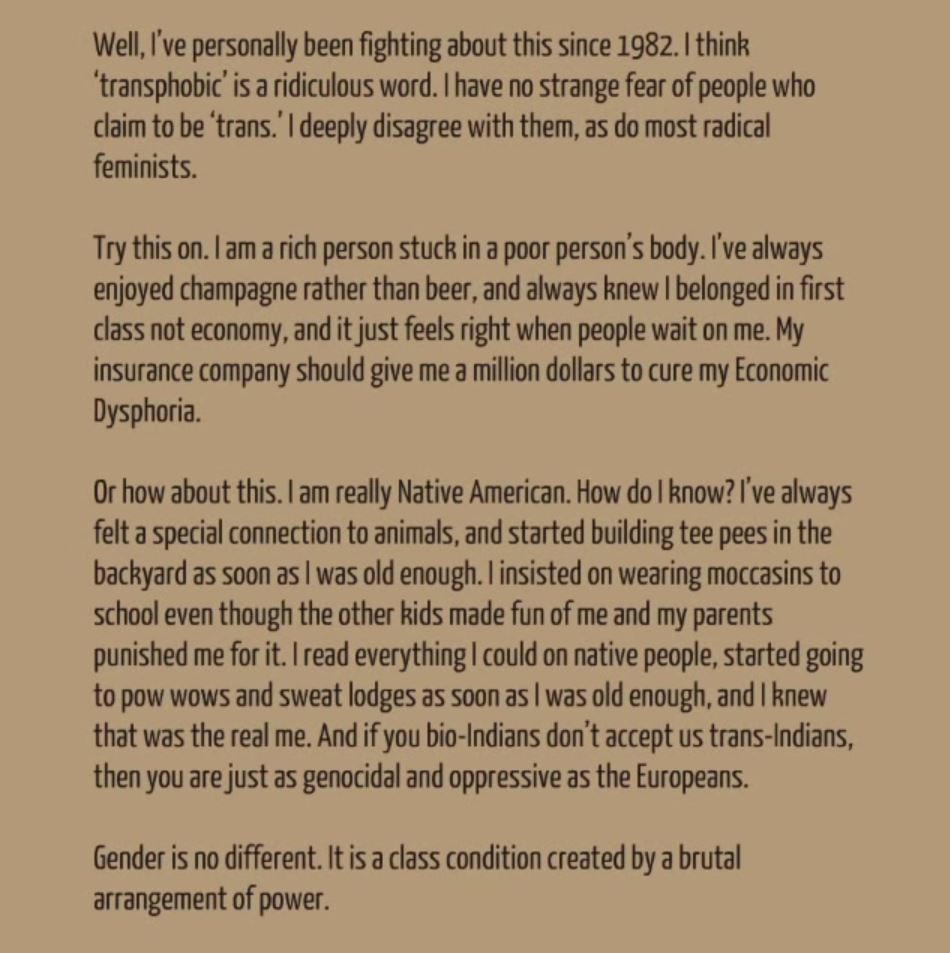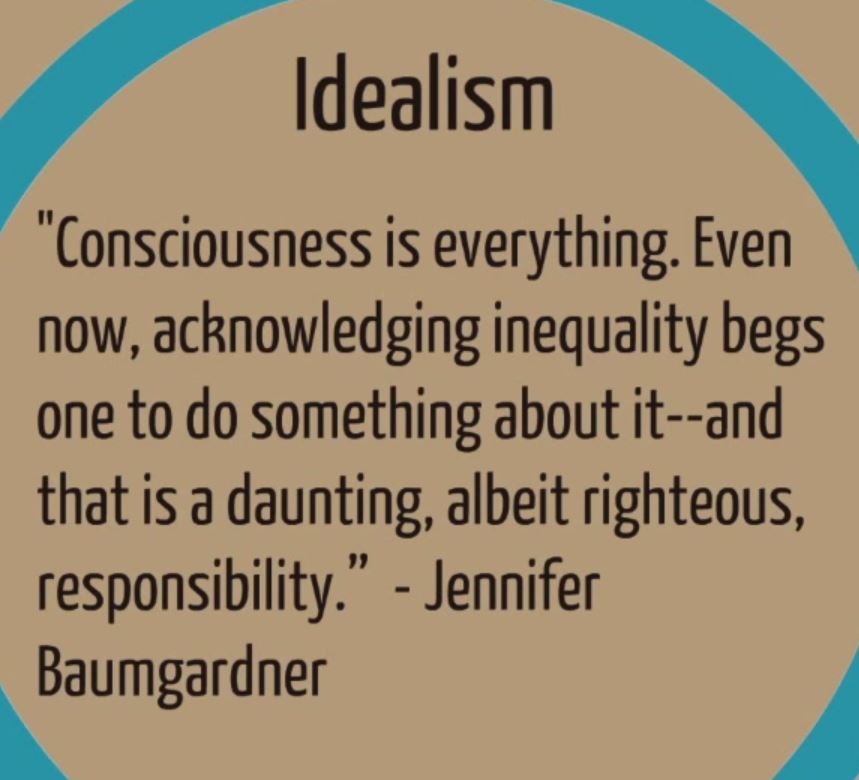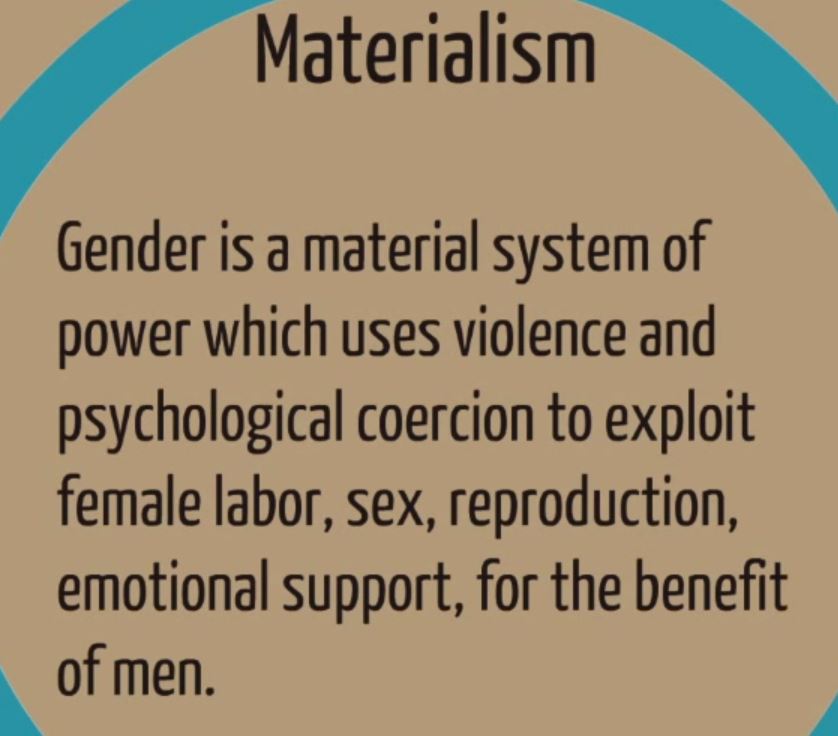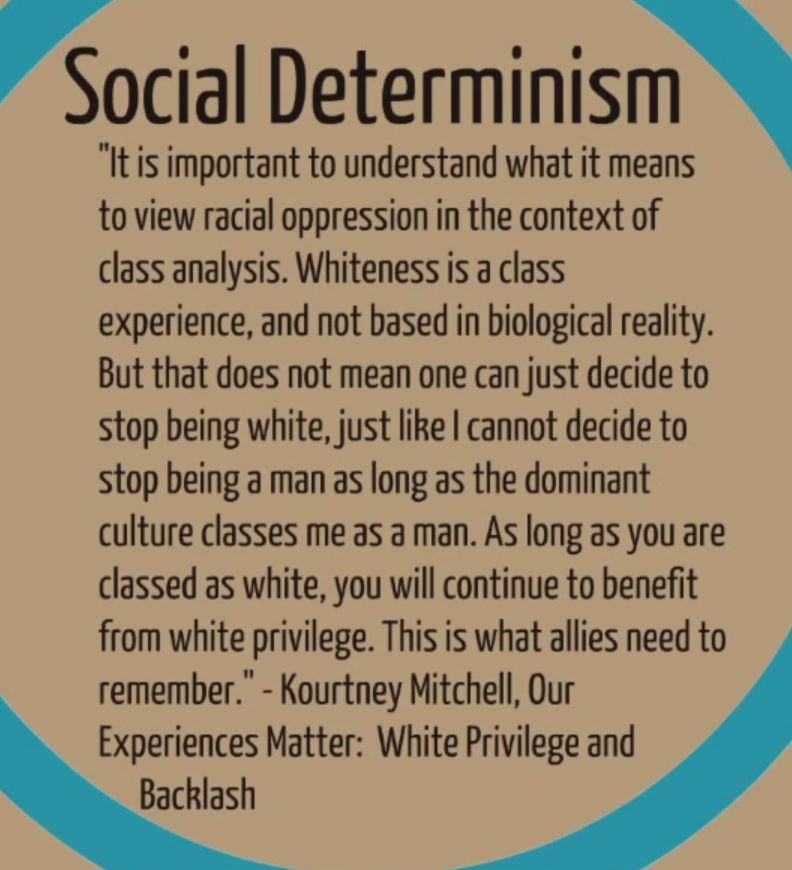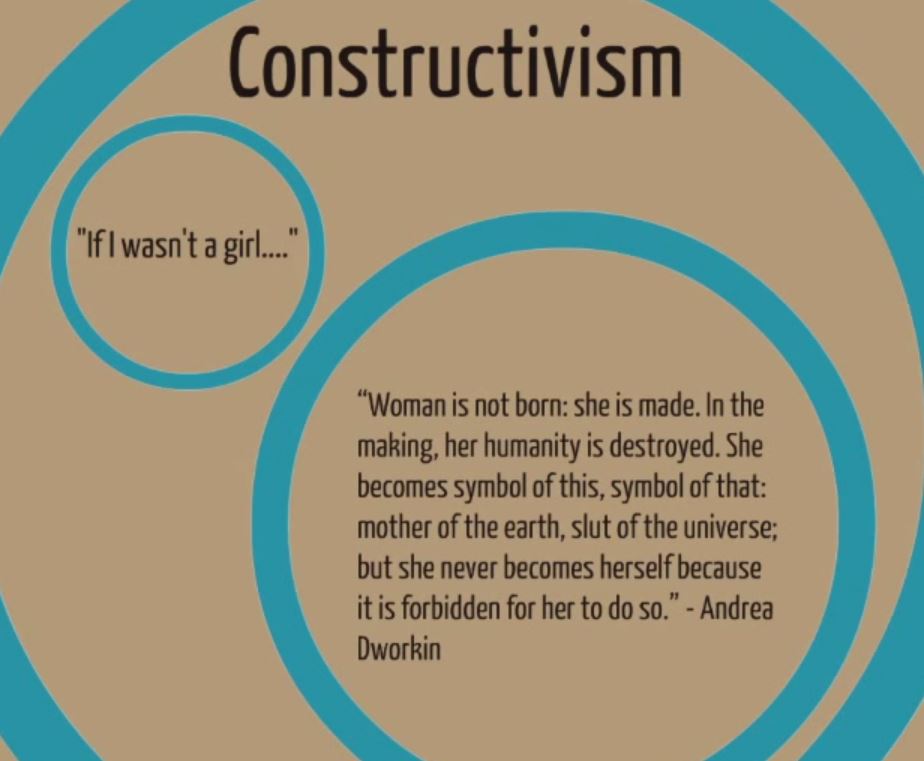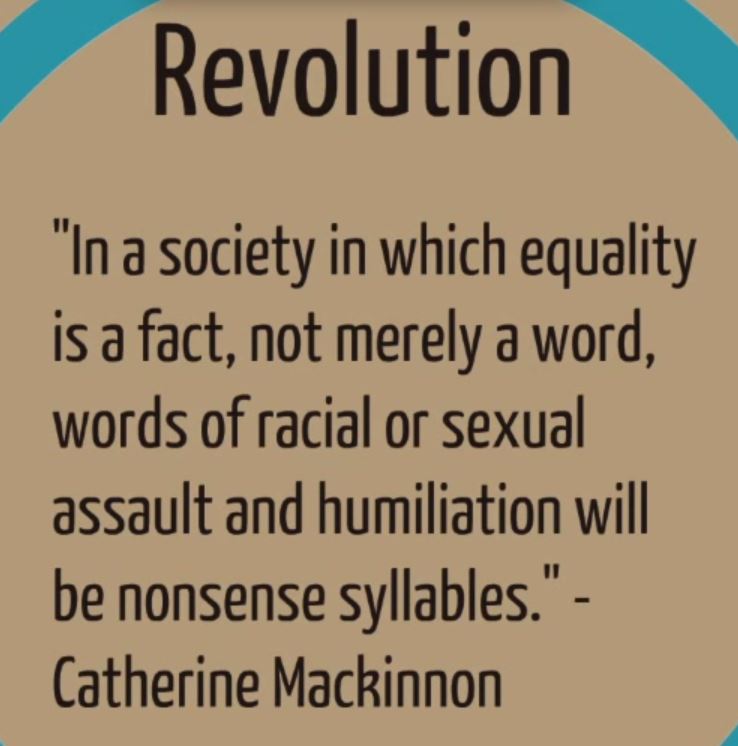Gender is not an individual choice, it is not a natural state, and it is not just an idea. Don’t settle for reform – strive for revolution, and the abolition of gender.
by Rachel Ivey, Deep green Resistance
(Video captions available in English and Portuguese. Contact us if you would like to translate this or other Deep Green Resistance videos to another language.)
I was really lucky to be able to give a draft of this presentation to the women’s gathering that happened before the Deep Green Resistance conference, so most of the women here have seen it already. I was really lucky to be able to benefit from their experiences and their feedback after I showed it to them first.
My name is Rachel and I was a teenage liberal. A little more about me for people who don’t already know me very well: I’m 23. I graduated with a women’s studies minor from a pretty typical women’s studies program at a mainstream university. Which I’ll go on to say doesn’t really mean very much, but if it’s important to you, I do have some kind of sanctioned background.
I wasn’t only a teenage liberal; I was a 20 year old liberal on the topic of gender. And then I was a 21 year old liberal on the topic of gender. Then my liberalism started to fall apart. It wasn’t all at once. I don’t think minds change overnight. I don’t think learning happens overnight. It took me a while to weed out that liberalism from my activist practice and I think the liberal view of gender was the last thing I had to kind of exorcise from my brain in terms of liberalism. It sticks hard. That’s one of the reasons why I feel this presentation and the way we’ve framed it and what Jessica and Lexy have said is so important. I think we understand the idea behind this presentation is that we understand why liberalism, especially in terms of gender, is so compelling. I still can understand that. And that’s one of the reasons that I’m excited we did it this way.
Through my work with DGR—but also before that—I was a feminist activist before I was an environmental activist. DGR is actually the first environmentally activist group that I’ve ever been affiliated with. Before that it was all feminism and women’s reproductive rights. I said that to say that I’ve had a lot of conversations about gender. And I’ve had them from the liberal perspective and I’ve had them from the radical perspective since I’ve gone on to spend a lot of time doing public speaking for DGR.
Over all that time of having conversations about gender I feel like I’ve developed a kind of standardized approach to beginning those conversations. They don’t always go in the same direction; every one’s different. But I can begin them the same way. So if I feel like I need to bring up the topic of gender, or if someone else is tending towards the topic of gender, I stop them right there and I have one question that I’ve got to have answered, and that is “What is your definition of gender?”. Because if I don’t understand your definition of gender and you don’t understand my definition of gender, you can bet your bottom dollar that conversation is not going to be productive. Because if you’re using two different definitions of gender you’re not even speaking the same language when it comes to feminism. That’s the core of it. It took me a while to figure that out. And I think I’m still figuring it out because I’m still having those conversations. But this is where I’ve gotten so far.
Today I’m going to frame this within the personal shift that I experienced with regard to my definition of gender—like I said, I was a teenage liberal—but I also want to talk about the larger implications, for our activism and for our political practice, of these two differing ideas of gender. Because ideas have material consequences when we act on them.
You would think that a group advocating the forcible dismantling of civilization would find that to be the most controversial topic you bring up. But no. It’s gender. Every single time.
Gender is contentious enough that it’s the only reason as far as I know that we’ve had DGR chapters defect from the organization. We’ve been denied an audience at speaking events and venues because of the view we take on gender.
And Lierre, who’s unflinchingly vocal on the topic, has received threats of violence and death threats because she does not hold back on her view of gender.
I’m really glad to be able to give some explanation to a topic that has been widely misunderstood and mischaracterized both by the wider activist community and within DGR itself. If there are misunderstandings about what I say today I’m really happy to answer questions, as are other members of the women’s caucus who are here. I think that’s extremely important.
I want to be clear though. I’m not presenting this topic for debate. Not in the slightest. This isn’t only my opinion; this represents DGR’s policy and it has actually happened that people have joined DGR with the intention specifically of shifting our view of gender or challenging the women’s caucus and women in leadership on their radical view of gender. And it failed miserably. It will again if it’s tried again because this is the core of DGR. This is the reason I joined DGR. This is the reason the women I look up to are in DGR. And if it changed we would all leave. And then where would you be? I wanted to get that out of the way first.
Characterizing these two definitions of gender is very simple on the surface but I don’t want to stay on the surface. I could say one is liberal, one is radical, but what does that mean?
Today I want to unpack these two definitions of gender according to what those implications of liberalism and radicalism actually mean in terms of the material effect that we’re likely to have on women’s lives.
But I also want to talk about some of the “light bulb” moments—the personal experiences that I’ve had—that shifted my view on gender. It wasn’t just reading a book. Things happen that shape your opinion and I think describing those things is the best way I know of to explain to you why I feel the way I do.
We have this word “gender” and there are two definitions of it out there. I’ve kind of distilled these from conversations I’ve had. Really there’s not a lot of variation. Either someone tells me one of these or they tell me the other one. They don’t mix elements, and that’s interesting to me, that it really is one or the other. It’s very polarizing.
The first definition of gender
In the first definition, gender, often called “gender identity” is a personal, individual quality possessed by each person. Gender identity is a subjective perception by an individual of their position on a spectrum between masculine and feminine, which are both neutral attributes politically in this first definition. Gender is performed outwardly through choice of markers or symbols like demeanor, body language, aesthetic choices like hair, clothing, presence or absence of makeup, and pronoun. These outward markers are what govern whether an individual regards you as male or female upon meeting you or interacting with you.
Each person has an innate gender identity, characterized with the words “masculine”,“feminine”, or in between which is independent of their biological sex. Each person is born with a biological sex (male, female, intersex) which is also apolitical in this definition. Sex and gender are not necessarily connected.
What is oppressive about it, according to people who adhere to this definition?
The fact that it’s a binary system in the dominant culture. The fact that upon birth you are socialized as either masculine or feminine. Generally, that’s seen as the primary gender oppression in this definition of gender. That system punishes anyone who doesn’t conform to either one of those binary options. It follows that this oppresses both women and men. It oppresses whoever is put into either one of those boxes, no matter why they’re put into it or what happens to them.
So how can we resist?
“Genderqueer” women and men reject the binary system, identify as “gender outlaws” and demand recognition for a range of gender identities, with masculine on one end and feminine on the other. In this definition, it’s turned from a binary to a spectrum. The two ends of the binary just get stretched out and we can see some more options in between.
This is the first definition.
The second definition of gender
The second definition: Gender is a hierarchical system which maintains the subordination of females as a class to males through force. Gender is a material system of power which uses violence and psychological coercion to exploit female labor, sex, reproduction, emotional support, etc, for the benefit of males.
Gender is not natural or voluntary, since a person is not naturally subordinate and no one chooses to be subordinated. Biological sex is a physical feature of each person, and those deemed female upon birth are socialized by the culture into femininity.
In this definition, femininity is defined as ritualized displays of submission to males.
So why is this oppressive?
Because it oppresses a class of people. And because there are oppressors. Power is wielded by groups of people. It’s experienced by individuals, yes. But it’s wielded by groups of people over other groups of people. And gender is no different.
And how can we resist? Women organize to overthrow male power and thus the entire gender system.
Instead of stretching out those binaries so there’s a spectrum in between, this definition advocates for the abolition of that system of domination and oppression. Instead of ideally there being more than two different gender identifications, in this definition there would be none.
Because without patriarchy there would be no need for gender.
Liberal vs. Radical
Anyone want to guess which of these I’m going to characterize as liberal?
I ask this as a serious question, because when I read them, if I step back and let go of the fact that I do have a clear conviction with regard to this, the first thing that jumps out at me about the first one is that it emphasizes individualism. That’s the first thing I’m going to talk about, and I’m going to spend a while on it because I think that’s the core of liberalism with environmentalism and it’s the core of liberalism in gender too.
Again, we have this word gender, and you’ll notice that this looks kind of like a Venn diagram, but the circles don’t overlap at all.
That’s because I don’t think these two definitions of gender have anything to do with each other. I think they use the same word to describe two contradictory definitions and I will explain why. I’ll start with the liberal view. I picked a quote for each of these that I think sums it up very well.
With this one, the quote is:
“Gender is a choice, or gender is a role, or gender is a construction that one puts on as one puts on clothes in the morning, that there is a ‘one’ who is prior to this gender, a one who goes to the wardrobe of gender and decides with deliberation which gender it will be today.”
And that is Judith Butler, who I spent a lot of time reading in school. She is a very prominent Queer Theorist, and she gets quoted a lot. I think her ideas sum up very well the liberal definition of gender so I am going to refer to her quite a bit. This quote really embodies individualism for me.
So we start with individualism: On the liberal side, gender is seen as a personal individual quality, and therefore politically neutral.
The individual is held up as so sacred in our “pull yourself up by your bootstraps” kind of dominant culture that it’s not politically correct to criticize or investigate anyone’s gender.
That leads to a lot of arguments, because if you try to analyze it politically people get offended on an individual basis. That’s not what I’m trying to do.
I’m trying to draw connections between how we see gender individually and the class issues that affect material reality.
With liberal environmentalism we see this individualism as the supposed ability of individuals to effect change just by changing themselves. “I’m going to buy something different, I’m going to wear hemp clothing, I’m going to reduce my carbon footprint and that’s going to help get rid of this system, or change this system, that’s causing environmental destruction in the first place.”
The logical conclusion of that is withdrawalism. If we just move ourselves out of that system entirely then we’re not contributing to it at all. The problem with that is that just because you’re supposedly not contributing to it, doesn’t mean you’re contributing to the dismantling of it.
The same thing seems to be happening with gender.
A term that Judith Butler coined is the “gender outlaw”, which is a really attractive idea when you’re a teenage liberal, because it supposedly puts that power in your own hands. If I just stop conforming, personally, to these systems or to these attributes that are connected to these systems, then the system will wither and die without me, right? Or at least I can personally escape the effects of it if I just don’t enact it in my own life.
Again, a “gender outlaw” is someone who abandons the gender stereotypes and the gender symbols that are traditional for their biological sex, and adopts those that are assigned to the other sex.
I do want to be very clear that I don’t really care how someone dresses. I don’t really care how they cut their hair or whether they wear makeup. Personally it doesn’t really affect me; I don’t think it’s political. But I do have a problem with people postulating that it is a political act of resistance in and of itself.
Dressing as, or appearing as, the traditional gender stereotype of the opposite sex is no more effective than living in a hut in the woods somewhere and expecting civilization to go down by itself. It doesn’t make any political difference on its own.
But I don’t have any criticism of people individually.
In the liberal view, gender oppression is defined as social restrictions on individual capacity to express their true gender. So it’s not one class oppressing the other; it’s that individuals can’t express themselves. They’re prevented from doing that, and that’s seen as the primary gender oppression.
When I was a liberal, this was really attractive because it left it all up to me. If I wanted to escape gender, I could do it. But it wasn’t all up to me. And the idea that it is all up to me is as insulting as it is preposterous. Because no one, including me, would ever choose a role that involves constant sexual harassment, the ubiquitous threat and in my case occasional enactment of male violence, and the certainty growing up, the conviction that you were meant for
exploitation, erasure, silence, but never personhood. I don’t think any of us think that anyone would choose that.
I’m not sure why, to most of the left, that’s different when it comes to gender. But it seems to be.
I want to emphasize here that I’ve so far avoided being beaten, sold, or killed by men, so as women go I’m pretty lucky. The fact that I can still identify class oppression in my own life really tells you something, since I’ve been that lucky.
So I got to college and read things like Judith Butler. The idea that I could change my outlook on life, change my own perceptions, to escape what feminine socialization was doing to me, was really too tempting to resist. I understand why younger women, younger men — younger people — are really attracted to that.
But I was wrong. And I was wrong because gender is not an individual choice and there was not something wrong with me.
Gender is class oppression of females.
I want to stop here and talk about gender as class oppression of females. I want to start talking about it with individuality.
I’ll repeat something I said earlier: in order to be an outlaw, there has to be a law. In the case of gender outlaws, that law is patriarchy, that system of values and that law is the class oppression of females. In order for gender outlawism and people describing themselves as trans to make sense, there has to be a majority in order for that minority to exist.
And that majority is “cis” women, of which I count myself among them. Or more accurately I don’t. That term is oppressive to females on multiple levels because it describes female people that have capitulated, in this view, to enacting feminism.
We’re taking the easy way out, girls!
We’re enacting the role we’re supposed to enact, and we’re privileged because of that. Because being socialized into a role of femininity encodes subordination so deep in your identity that you don’t call it that, you call it your nature, you call it your religion, you call it your culture.
I don’t thank that’s a privilege. And I find it ridiculous that I have to describe the fact that it’s not a privilege.
We’ll go over gender according to radical feminists, and I’ll talk about class issues as opposed to individualism in a second, but first I have this quote:
“It’s become popular in some activist circles to embrace notions from postmodernism, and that includes the idea that gender is somehow a binary. Gender is not a binary. It is a hierarchy. It is global in its reach, it is sadistic in its practice, and it is murderous in its completion. Just like race, and just like class.
Gender demarcates the geopolitical boundaries of patriarchy—which is to say, it divides us in half. That half is not horizontal—it is vertical. And in case you missed this part, men are always on top.”
I can envision the anti-DGR, anti-radical feminism party line being “Well of course you’d quote Lierre Keith. Of course you would.” You know, I would. And part of that is because she’s my friend and because I appreciate her. But it is also because she was the first person I heard say something like this, and that is why it had such an effect on me. This encapsulates the class issues that come into radical feminism.
Group/Class: for radicals, gender itself is oppression. I’ll repeat that: Without oppression, there can not be gender. They are one and the same when it comes to sex oppression of females.
For radical feminists, gender is the chain, and patriarchy is the ball, and it’s cuffed to the ankle of every female person born.
That socialization is not escapable, even if you move to that hut in the woods.
If you have a TV, it’s there. If you know men that have been socialized into this culture, it’s there. If you have a mother who was socialized as feminine, it’s there. And that’s what makes it a class issue.
I could not escape gender by changing myself because changing my appearance did not change the fact that I was socialized into the sex class called “women” against my will.
The fear and desperation that comes from that is not something someone would choose, and it was not my fault. But even after I realized that, it took me a few years to hold my head up when I walked, and most days I still have to put conscious effort toward it.
When people postulate that gender is individual, that my individual identity involves walking like I’m about to be kicked, or holding my head down when I speak, that’s offensive. And you can’t put it any other way. Because no one chooses that identity; no one is innately subordinate.
It’s not a coincidence that 91% of those who are raped are female, and 99% of the perpetrators are male. It’s not a coincidence that the shoes make it hard to run away.
It’s taboo to acknowledge that females are socialized from birth onward into a subordinate sex class for whom exploitation by males is so ingrained into the social norms that we can’t recognize it any more. That it’s become a “choice”, that it’s become our “identity.”
It’s taboo within mainstream liberal feminism to address the fact that males are socialized from birth onward into a privileged sex class that feeds on violation and subordination of not only women, but as all of you can recognize, of the oceans, of the earth, of life itself.
People who are critical of DGR’s feminist stance often seem unaware that Lierre isn’t the only radical feminist in the organization —far from it. Because she is a woman who doesn’t hedge her words, doesn’t hold her tongue, and really doesn’t accept liberal bullshit, she’s become a lightning rod for the type of flack that radical feminism tends to get. I find that unfair, first of all. And a lot of that flack comes from a private email she sent that got spread all over the internet. When people criticize DGR based on the text of that email, they seem to expect us to be so ashamed of it or so offended by it ourselves, that we won’t even address it. So I’d actually like to read it out loud.
“Well, I’ve personally been fighting about this since 1982. I think ‘transphobia’ is a ridiculous word. I have no strange fear of people who claim to be ‘trans.’ I deeply disagree with them, as do most radical feminists.
Try this on. I am a rich person stuck in a poor person’s body. I’ve always enjoyed champagne rather than beer, and always knew I belonged in first class not economy, and it just feels right when people wait on me. My insurance company should give me a million dollars to cure my Economic Dysphoria.
Or how about this. I am really Native American. How do I know? I’ve always felt a special connection to animals, and started building tee pees in the backyard as soon as I was old enough. I insisted on wearing moccasins to school even though the other kids made fun of me and my parents punished me for it. I read everything I could on native people, started going to pow wows and sweat lodges as soon as I was old enough, and I knew that was the real me. And if you bio-Indians don’t accept us trans-Indians, then you are just as genocidal and oppressive as the Europeans.
Gender is no different. It is a class condition created by a brutal arrangement of power.”
I’d like to follow that comparison a little further to make it a little clearer. I’ve asked, at first out of genuine curiosity when people would bring this up: “Why, if gender is something that socialization doesn’t matter, it’s voluntary, you can be trans-gendered or in the more specific case, a trans-woman? Why is that acceptable when deciding that I’m trans-black is not?” I just want to follow it through. What would it mean if I were trans-black, if I decided that was true? Would it mean that I wore clothes that are traditionally and streotypically believed to be worn by African Americans? Would it mean that I identify more strongly with African culture than I do with white culture?
No. And I don’t think I really have to explain why. Because that’s offensive.
I don’t have the cultural background that makes that true; I have not endured the oppression and abuse that goes along with being a marginalized racial class.
So for me to claim that I’m more strongly identified with that is actually just reinforcing those stereotypes. And I honestly don’t really see what’s different about gender. If we accept that gender is a class condition, not an individual condition, that analogy makes sense.
People told me about these analogies before I read them, and once I actually read them, I was underwhelmed because I didn’t really see what was not straight-forward about calling gender a class position.
Next I’d like to talk about idealism.
On the liberal side, gender is idealist.
This is a quote from Jennifer Baumgardner, who I used to idolize. I went and saw her speak. She’s a very nice woman. She does a lot of really good work. But she says that:
“Consciousness is everything. Even now, acknowledging inequality begs one to do something about it and that is a daunting, albeit righteous, responsibility.”
The idea that consciousness is everything, just like with environmentalism, leads to an activist practice that’s focused on changing people’s minds as though oppression were a mistake that could be corrected if we could just explain to men that they should stop exploiting us.
It begs us to do something about it because we’re the ones affected by it. But the realization that they’re benefiting from the oppression of others leads the oppressor class to dig in their heels, not to do something about it.
I like to use the example of rape culture, to get away from idealism, because rape is not an idea. Again, there’s a reason why 91% of rape victims are female, and 99% of the perpetrators are male. If she’s lucky, the survivor of rape will be one of the 2% whose case actually goes to trial. 97% of rapists never see a day in jail. These are not ideas; they are reality.
 When we’re talking about rape culture and idealism, we have to talk about Slut Walk. I give you one guess who this intrepid young feminist is. Do the curls give me away? I’m not sorry that I participated in this, I actually organized the one at my school, because I think that, just like me, the women who participate in this genuinely want to end rape culture because what woman wouldn’t? The fallacy, the one I fell into (I was 21 in this picture) was that changing people’s ideas about rape culture would actually change rape culture. It says “END RAPE CULTURE” in marker.
When we’re talking about rape culture and idealism, we have to talk about Slut Walk. I give you one guess who this intrepid young feminist is. Do the curls give me away? I’m not sorry that I participated in this, I actually organized the one at my school, because I think that, just like me, the women who participate in this genuinely want to end rape culture because what woman wouldn’t? The fallacy, the one I fell into (I was 21 in this picture) was that changing people’s ideas about rape culture would actually change rape culture. It says “END RAPE CULTURE” in marker.
The fallacy here is not the desire to end rape culture. The fallacy is that marching around with “END RAPE CULTURE” on my back was actually going to end rape culture. Again, it’s based on the idea that we can change people’s ideas about what gender means: if we just redefine the term “slut” then it won’t be an oppressive term to women any more.
But we forget that the lines of oppression are not demarcated by the oppressed. They are chosen by the oppressor, and they can only be changed through force, not through catchy chants. Which is a shame, because I’m really good at catchy chants.
For radicals, gender is maintained through force. Gender is a material system of power which uses violence and psychological coercion to exploit female labor, sex, reproduction, and emotional support, for the benefit of men.
Rape culture, right along with female poverty, lack of education, the trafficking of our bodies—it’s maintained through material structures. Not through people’s ideas.
Gender is a system of power that uses violence and psychological coercion to maintain the oppression of females. Not to just control our ideas about it, but to control actual physical reality.
Next on the liberal side we have voluntarism, and this again gets back to the heart of the controversy of DGR around feminism. That is, our policy surrounding women’s spaces, and how that relates to people who describe themselves as “trans.”
I again feel sad that I have to put this as a disclaimer, but through my time speaking in public for DGR, we’ve been asked whether we’re a “transphobic” organization. Do we hate trans people? I can only speak for myself when I say that I do not hate trans people as a group of people; I don’t hate the individual trans people that I know.
My personal feelings towards individuals has nothing to do with my political analysis of what that definition of gender means for all of us, and for people as a class.
In the liberal view, gender expression — I took this off the HRC website — is seen as a voluntarily chosen set of external characteristics and behaviors that are socially defined as either masculine or feminine, such as dress, grooming, mannerisms, speech patterns, or social interactions. What follows from this is that if gender is voluntary, then people who are oppressed by gender are choosing to be oppressed.
I come back again to the fact that no one chooses to be oppressed. If we accept this definition of gender, we accept that people who are oppressed for being born female, are choosing to be in that position and that if they wanted to, they could reject that and move away from it by their own personal choices and do something else.
I think back to a person I met who identified themselves to me as a transwoman. Again, this person was very sweet; I was very glad to meet them; I don’t mean this as a personal attack. But something they said really stuck with me as a demonstration, when they said “I don’t have the male privilege that I was raised with any more.”
I had to think about that for a while to think about what I thought about that, and whether that was true. And I realized that it wasn’t. Because being raised with male privilege is the privilege.
Being raised with the knowledge that you are fully human and you deserve rights and that your body is not fair game and that the court system considers you human is the privilege. And that doesn’t just go away.
So an alternative name for this presentation is “I’m not afraid of your penis but I’m terrified of your socialization.” because I think that people think when I say things like this that I consider males innately terrifying, that they’ll never get out of it. I’ve seen men get out of that system of behavior.
But getting out of being socialized into masculinity, which is based on violation and domination, does not make you female. It makes you a revolutionary, because that is what is actually going to change the culture.
This next quote is a quote from Kourtney Mitchell. He wrote an essay on white privilege and backlash.
“It is important to understand what it means to view racial oppression in the context of class analysis. Whiteness is a class experience, and not based in biological reality. But that does not mean one can just decide to stop being white, just like I cannot decide to stop being a man as long as the dominant culture classes me as a man. As long as you are classed as white, you will continue to benefit from white privilege. This is what allies need to remember.”
If you put this in the context of gender oppression, it is just as true. This is what allies need to remember, that whatever your intentions are, whatever your external presentation is, you’re going to have that socialization and therefore that privilege and that identification by the dominant culture as long as you live.
Just like as long as I live I will have to think about my posture so I’m not hiding. I will have to speak extra loud most of the time in order to counteract the social forces that tell me not to speak at all. None of that is going to change just because I want it to. None of that is voluntary like it is on the liberal side.
Now I want to talk about a kind of conflict that I’ve seen within liberal feminism.
I don’t think oppression is natural or voluntary. But on the liberal side, oppression is both natural and voluntary. This is because gender is seen as both natural, something innate that we’re born with, and something that we choose from the wardrobe of gender every day, like clothes. It’s hard to argue from a radical perspective, because liberals have the market cornered on the naturalism and voluntarism. They can argue it from both sides, and switch in the blink of an eye, and I am having a really hard time figuring out how to point out that this is a basic conflict of logic.
If something is innate, it can not be voluntary.
My brown hair is innate, therefore it’s not voluntary. The same goes for gender. It can’t be both, and in my view it’s neither.
Next is constructivism. Instead of being natural, in the radical view gender is constructed. It is artificial. It is imposed on humans who would enact humanity if given the choice. But instead, this constructed identity of subordination and domination is impressed upon us.
This quote is from Andrea Dworkin:
“Woman is not born; she is made. In the making, her humanity is destroyed. She becomes symbol of this, symbol of that; mother of the earth, slut of the universe; but she never becomes herself because she is forbidden to do so.”
For females this is the reality of the construction of gender, that it is not escapable. Just because it’s constructed doesn’t mean that it can be deconstructed at will. It doesn’t mean that it can be deconstructed individually. In order to deconstruct it, it will take organization, which is something that has not happened on a mass scale yet and that’s why patriarchy still exists.
The thing that brought this home to me was my relationship with a student I used to have. We went over basic sex ed, we went over self esteem, and media literacy. A lot of the time we just talked about these things, talked about our experiences of gender and of being a teenager in this culture.
I met a girl who had been subject to incest, trafficking, rape, more horrific incidences than I could comprehend. She may have been the most horrifically abused person that I had ever met in that context. Part of the time that I knew her…
She already had short hair, she cut it a little shorter, she asked me to use the pronoun “he” which I also did. I didn’t really think very deeply about that at the time. At the time if you had asked me “Why did she do that?” I would have said it’s her innate gender identity. She was born wanting to do that. Now that she’s away from her parents, and in this institution, she feels like she can, without repercussion, and this is a good thing, because she can enact what is actually her. But I don’t believe that any more.
One of the reasons I don’t believe that is because one of the days in class, I asked all of my students to draw a picture. I knew what I thought they deserved, but I wanted to know what they thought they deserved, what they wanted their lives to be like when they got out, what their lives would be like if they had gotten what they wanted and what they needed throughout their lives.
They drew a lot of different things, but I kept the girl’s drawing for a really long time. In one corner she drew what was clearly a girl’s face. It had pink lipstick, a pink bow in the hair, and tears running down the face, and it had a big X through it. And underneath it she wrote words she thought described being a girl. She wrote “pain”, she wrote “fear”, she wrote “rape”, she wrote words in that vein. In the other corner she drew a human face — in fact it looked a lot like her. It had short, brown hair, no makeup or accessories, and the face was smiling. And underneath it she wrote “confident”, she wrote “happy”, she wrote “safe.” And underneath that she wrote me a paragraph, and it started with “If I hadn’t been a girl…”
“If I wasn’t a girl, I wouldn’t have been raped. If I wasn’t a girl, I wouldn’t be scared. If I wasn’t a girl, I wouldn’t be here, at this institution.”
I kept that for a while, because I didn’t really understand it right away. It took a while for that to sink in. I don’t bring up this example to try to convey that every person who describes themselves as trans does so because of the type of horrific abuse that she endured. I do it to assert that being socialized into femininity is abuse, and she just experienced it more extremely than most of us do. She did what she could to get out of it at that time. As much as I want that for her, that doesn’t mean that she actually could get out. She got out of that institution, but she did not get out of femininity, no matter how short she cuts her hair, and no matter what name she uses.
Gender is anything but natural. She was not born with a feminine brain or a masculine brain, but she was born with a female body and in this culture that means she’s considered less human than members of the sex class “men.”
It’s no wonder to me that she wanted to escape that oppression of female socialization by rejecting her femaleness, but like Kourtney said, just as men cannot erase their masculine privilege, women cannot choose to erase the oppression of being socialized into femininity.
Which brings me to the final distinction between the liberal and radical conception of gender that I’m going to talk about today, which is the difference between reformism and revolution.
This is a long quote; I’m not going to read all of it, because it’s not necessary.
“That’s one of the things that the word ‘queer’ can refer to: the open mesh of possibilities, gaps, overlaps, dissonances and resonances, lapses and excesses of meaning when the constituent elements of anyone’s gender, of anyone’s sexuality aren’t made (or can’t be made) to signify monolithically.”
This is a quote from Eve Sedgwick, who’s another really prominent queer theorist. She goes on to say that people can identify as “radical faeries, pushy femmes, transwomen, lesbians who sleep with men, lesbian-identified men”… she goes on like that for a while, it’s a long paragraph.
The point I’m trying to get to, by reading all of that academic language, is that all of those identities are still based on domination and subordination.
Just because we’re putting extra categories in between the two, does not mean that we’re getting rid of the system based on animosity between the two.
On the radical side, we have revolution. This is Catherine Mackinnon:
“In a society in which equality is a fact, not merely a word, words of racial or sexual assault and humiliation will be nonsense syllables.”
In the radical feminist view, this will be what happens to the words “man” and “woman”, along with the sex-class system based on subordination and domination that those words signify
The post End of Gender: Revolution, Not Reform appeared first on Deep Green Resistance News Service.

